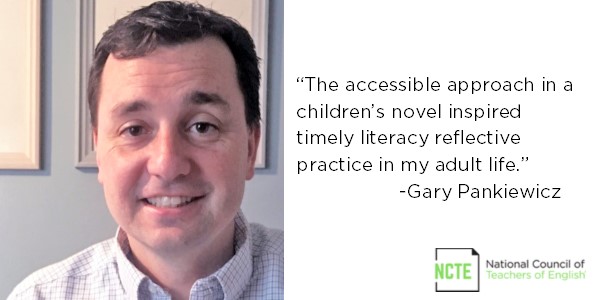This post is written by member Gary Pankiewicz.
Some might find it strange for a forty-something language arts educator to reach for a children’s novel over a brief school vacation, but, in this case, I highly recommend it. Up to my ears with work and graduate study—and reserving time for my wife and three boys—a short text gave me a quick literacy fix when I was over busy. Simply put, the accessible approach in a children’s novel inspired timely literacy reflective practice in my adult life.
 Knowing that my reading time would be short, I packed up a copy of The Dreamer by Pam Muñoz Ryan and Peter Sis in my travel bag. I had just read and researched Muñoz Ryan’s Echo for a new unit plan for work, and I pulled The Dreamer from the school library because I wanted to read more of Muñoz Ryan’s writing. There would only be time to dip into a Franzen novel, but there was ample time to dig into The Dreamer. In my experience, children’s novels and young adult books can provide that same spark to grapple with complexity and perspective—the thing I love most about any literary text. Emphatically, reading The Dreamer was like taking a soothing medicine, albeit cherry-flavored, on the course for sustained healing and appetite anew. What began for me as a quick literacy escape during a busy spring break burgeoned into an opportunity to stay connected with the artistry of teaching English—and the craftsmanship of being a dad.
Knowing that my reading time would be short, I packed up a copy of The Dreamer by Pam Muñoz Ryan and Peter Sis in my travel bag. I had just read and researched Muñoz Ryan’s Echo for a new unit plan for work, and I pulled The Dreamer from the school library because I wanted to read more of Muñoz Ryan’s writing. There would only be time to dip into a Franzen novel, but there was ample time to dig into The Dreamer. In my experience, children’s novels and young adult books can provide that same spark to grapple with complexity and perspective—the thing I love most about any literary text. Emphatically, reading The Dreamer was like taking a soothing medicine, albeit cherry-flavored, on the course for sustained healing and appetite anew. What began for me as a quick literacy escape during a busy spring break burgeoned into an opportunity to stay connected with the artistry of teaching English—and the craftsmanship of being a dad.
Thinking about the book and literacy classrooms. In the text, Netfali, the young protagonist, is a soon-to-be realized poet on a journey that uncoils his spirited imagination and jettisons his artful capacity. He comes up against trials with those who do not understand his perspective or his emotion. This leads to a thorough exploration of one’s fear and a discerning look at humanity in our communities. For me, the highlight of the book came from Netfali’s care for an injured swan with metaphorical play that foreshadowed the book’s climax. All the while, peppered poetic interludes and illustrations showcased multimodal expressions that implored rereading and rethinking throughout.
Thinking about the book as a literacy educator and as a parent. Since children are the intended audience for the book, I often found myself reading with young people and their perceptions in mind. Netfali’s most personal challenge resides in a father who insists on more “useful” goals and a community that may not be ready for Netfali’s unrealized voice. This was a big reminder to be weary of squelching dreams through professional and personal utilitarianism. For example, the support of rigorous trajectories for college readiness is important, but, for many students (and kids), this work could easily become tedious without opportunities for choice and voice in the literacy classroom as well as in their lives at home. Indeed, analyzing these characters’ actions and motivations served as a call-to-action to encourage vision—especially in our apprentice-like students and children. Do I model passion enough, and do I give enough room for my kids to find theirs? Like Netfali’s uncle Orlando, educators and parents must proclaim our relational pride more often and encourage our kids’ revelry—strategically. Let’s go!
To say that I love a good children’s novel or young adult book privileges adult books through the implied contrast. So, let’s just say that I really enjoyed reading The Dreamer. It refreshed my connection to the eloquence of literacy with an opportune invitation to rework my own story.
Some other recommended swift reads:
- The One and Only Ivan by Katherine Applegate
- Wonder by R.J. Palacio
- The Invention of Hugo Cabret by Brian Selznick
- Of Beetles and Angels: A Boy’s Remarkable Journey from a Refugee Camp to Harvard by Mawi Asgedom
- Any book from Lowry’s Quartet
A little research into the novel also introduced me to the poetry of Pablo Neruda. But, I’ll save my nod to poetry for my next blog.
Gary Pankiewicz is the K-12 Language Arts and Literacy Supervisor in the Fair Lawn, NJ, School District and NCTE member since 2003. He is also an adjunct professor and doctoral candidate at Montclair State University.

